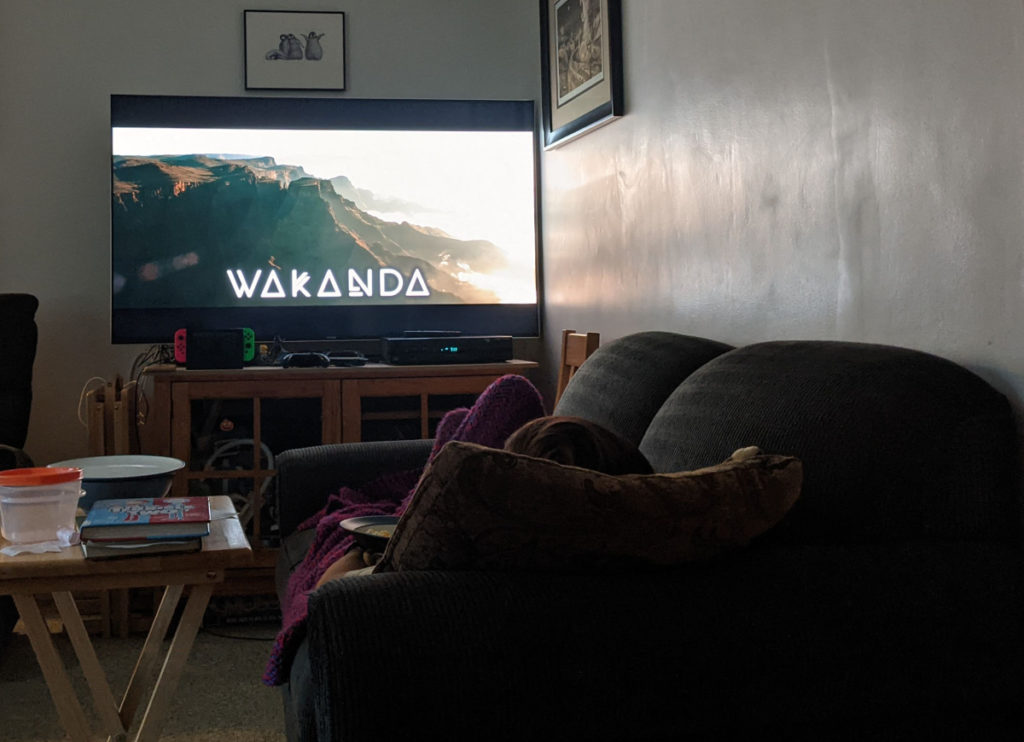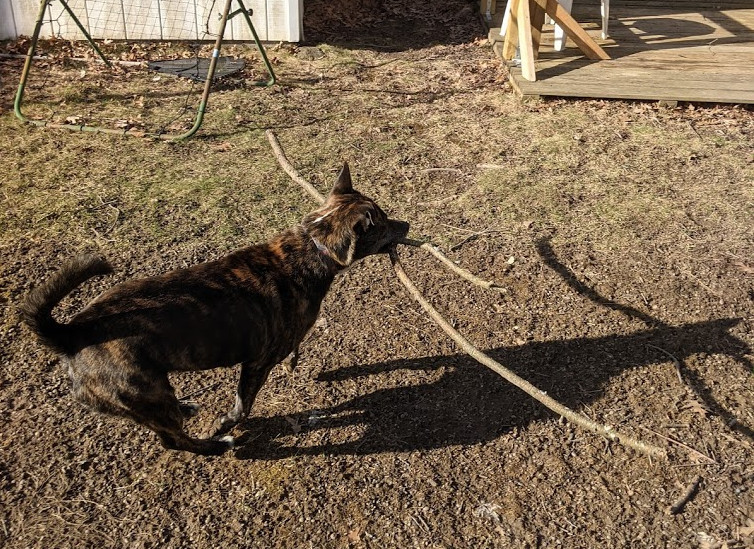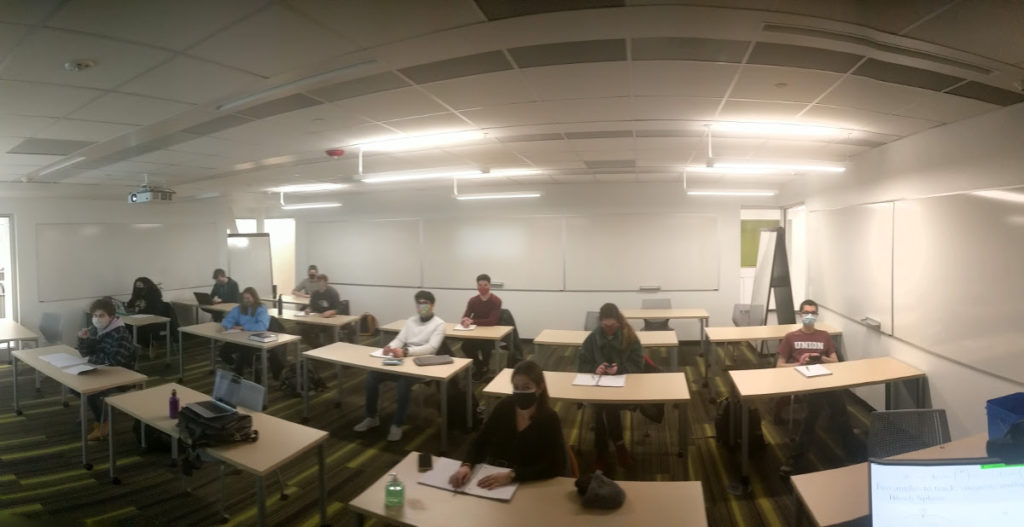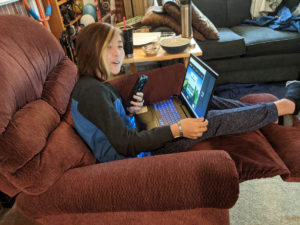We’ve added a regular Movie Night option to our routine with the kids, on Friday and Saturday nights (and the occasional Thursday or Sunday when there’s a long weekend), so I’ve been watching more movies than I have in years. Most of these are re-watches for me, trying to recall things from the 80’s and 90’s that the kids would like– for example, I finally badgered them into watching Die Hard on my birthday a couple of weeks back, and last night we watched Shanghai Noon because The Pip really enjoyed Owen Wilson in Loki. I’m not going to try to reconstruct all of the stuff we’ve watched, but will at least try to comment on the new releases that got into the mix.
The Mitchells Vs. The Machines: I think this is the clear standout of the new movies we watched. Fast-paced, funny, sweet without tipping over into cloying. We’ve gotten some mileage out of the image-recognition joke (“Dog…pig… dog… pig… burrito… ERROR”).
Soul: I liked this more than the kids, I think, which is not super surprising because it’s pretty heavy. The slapsticky bits with the cat played really well, but some of the other humor went over their heads. A really well-done story, making good use of the animated medium.
Luca: The most recent of the new movies, a perfectly fine piece of work from Pixar. Not near the top of their work, but solid.
In the Heights: Kate and the kids are way into Hamilton which is just Not My Thing; this is more of that. It’s clearly a very well done example of what it is, but what it is is not a thing that I want.
Inside: Bo Burnham’s pandemic special. SteelyKid went through a Burnham phase a while back so I suggested it when it popped up on Netflix. It mostly just made me feel old, because it’s very much working in the visual language of SteelyKid’s generation, which I can only barely follow. SK really loved it, though, and has re-watched it multiple times since, and went down a rabbit hole of analysis videos about it to boot.
Update: I knew as I was writing this that I was forgetting something; specifically, that was Raya and the Last Dragon, which we watched when it was released to streaming. This was a pretty good Disney movie; not top-tier, but well done and enjoyable.
In addition to the semi-regular Movie Nights, I got a stationary bike back in December, and we purchased a much larger TV for the living room, moving our old plasma screen downstairs, so I’ve watched a bunch of episodic content on days when the weather was too crappy to exercise outdoors. These include (but are not limited to):
Shadow and Bone: Kate and I actually watched the first couple episodes together, but she wasn’t that into it, so I finished it while biking to nowhere. Netflix clearly put a ton of money into making it look great, and it’s the right level of florid melodrama to serve well as a diversion while exercising.
The Irregulars: A step below Shadow and Bone in the production quality department, but very much in the same melodramatic vein. Everybody involved is very pretty, though maybe implausibly diverse for Victorian London.
The Mandalorian: I watched these more or less as they came out, a rare case where I was actually sort of up-to-date on pop culture trends. It was good fun, though I would’ve been happier if it had avoided connecting to the main Star Wars movie plotline, and just stayed on the fringes of the galaxy.
The Umbrella Academy: I watched the first season right when it dropped, and it was fun; SteelyKid independently discovered it around the start of the second season. It’s pretty ridiculous, but a lot of fun, particularly Five’s contempt for the others, and the bit where Klaus tries to tell the frog and scorpion fable is awesome.
Age of Samurai: A history series about the unification of Japan at the end of the 1500s (Oda Nobunaga, Toyotomi Hideyoshi, and Tokugawa Ieyasu), with a mix of talking-head segments and lurid re-enactments. This stuff is great for exercise-bike watching.
The Lost Pirate Kingdom: Same idea as the previous, but about the golden age of piracy in the Caribbean in the early 1700s. Again, terrific to watch while pedaling a stationary bike.
As alluded to above, the kids and I are watching Loki, which has been enjoyable to this point. It’s maybe halfway through the season, though, so not really possible to evaluate as a whole.
Some other things I’ve tried and not finished:
Cobra Kai: I’ve watched most of the first season, and enjoy it when it’s on, but there’s kind of a high level of anxiety around the plot as it’s building up, and I often just don’t want to deal with that. Which is why I’ve leaned a bit more toward florid melodrama, where the stakes are more ridiculous.
Jupiter’s Legacy: I watched one episode, and it is Trying So Very Hard to be Grim and Serious and everyone in it is ostentatiously Troubled and just, no thanks.
Invincible: This was better than Jupiter’s Legacy, but the shocking twist at the end of the first episode was, well, shocking, and I’m not sure I want to watch more.
I’m probably forgetting some stuff, but this is enough of a list to make a point of some sort…








